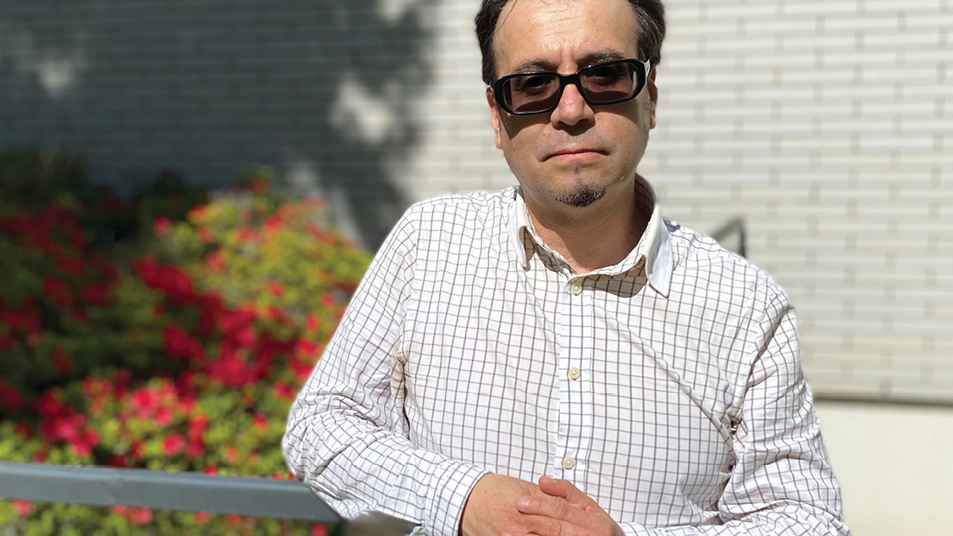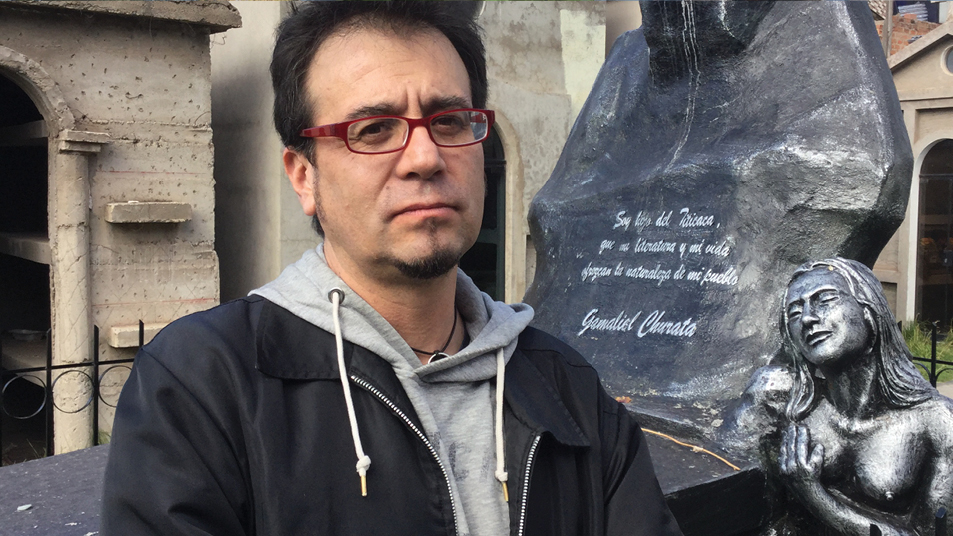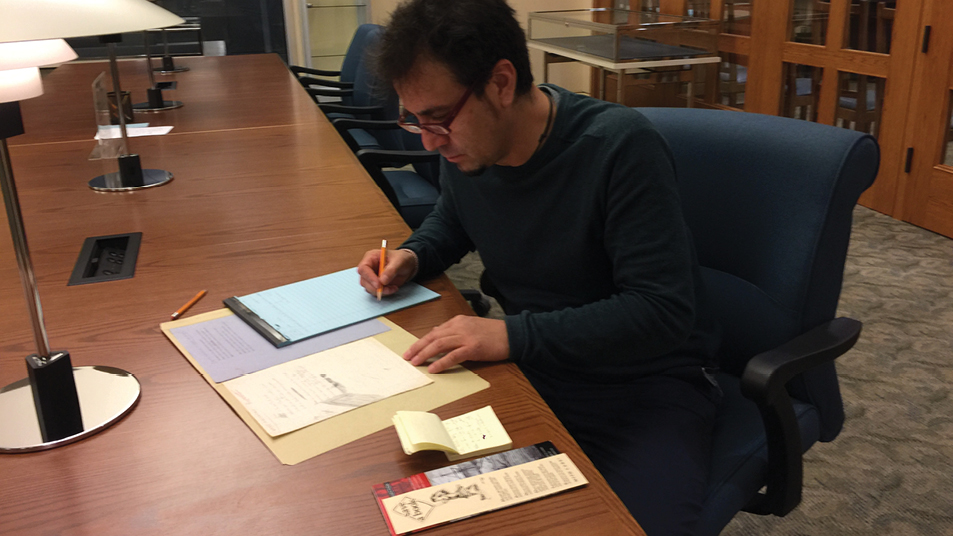Dr. Rodolfo Ortiz, former PhD student of Hispanic Studies at UBC, shares about his doctoral research and its impact on the intellectual community, his graduate student experience at UBC, and his career goals.
Research


Dr. Rodolfo Ortiz in UBC Vancouver campus, May 25, 2022.
“I analyze the in-betweenness of the aesthetic and the political proper to the complex interplay of the avant-garde movements, political revolutions, and social transformations in the Andes.”
I examine literary magazines from Peru and Bolivia in the early 20th century, and their role in the intellectual and cultural fields in the Andean region. Based on a topology of knots and tangles, I look at the relationship between these magazines and the political and cultural transitions. I question the idea of an unviable modernity in the Andes.
From magazines of the region such as Gesta Bárbara (1918-1926), from Potosí, to Puno’s Boletín Titikaka (1926-1930), I examine how these magazines, as dispositives, operated in-between several registers: the literary and the political; the visual and the language (both regional and cosmopolitan); the insurgency movements from different kinds and the nation-state. In short, I analyze the in-betweenness of the aesthetic and the political proper to the complex interplay of the avant-garde movements, political revolutions, and social transformations.
I study the circuits of an “intellectual barbarism” that, through these magazines, (dis)articulates geopolitical paths. I also discuss the discursive heterogenization by which ideas are knotted as soon as their horizons become entangled or diluted. In this mechanism of varied velocities, I highlight the destituent power of an off-center and fugitive intellectuality embodied by Arturo Borda, Pablo Iturri Jurado, Óscar Cerruto, Eustaquio K’allata, Gamaliel Churata, among others. To put it differently, I argue that in the Andes, during the first decades of the 20th century, there is a destituent power that pugnaciously escapes the political and cultural nets of its time.
While there are important studies about the region’s avant-gardes, my study proposes rethinking the way the region has been thought about from an overlooked cultural product: the literary magazines. These cultural texts are unknown or very little known in the field of Andean and Postcolonial Studies. To that extent, my research reflects on an overlooked topic while also dialoguing and challenging both Andean and Postcolonial Studies.
By proposing the concept of knots, I reflect on the way postcolonial thinking and traditional approaches to the Andean region have closed possibilities for otherness and escaped from the imperatives of both the market and the state. To put it differently, I challenge how the figures of the national subject, discursive homogeneity, geopolitical reason, instrumentalized collective formations, the Indian—as a transcendental episteme—, and the politics of a utopian language have all been knots that falsely proclaim solutions and closures to the problems faced in modern times in the region.
Perhaps this research echoes best with Posthegemonic and/or Infrapolitical Studies; maybe, even, my research is more attuned to a broader intellectual community outside of academia because my contribution has much to do with the discursive fissures of the ideological coatings that are the “spiritual bread” of traditional academia. My interest is to open lines of flight and put them to the test in other contexts and intellectual horizons.
I am currently editing my thesis manuscript to publish in English and Spanish. And I’m in conversation with the external examiner of my thesis, Javier Sanjinés, an important figure in the Andean Studies field at the University of Michigan.
Graduate Student Experience


Puno, 2018, next to Gamaliel Churata's tomb.
While finishing my doctoral thesis on Arturo Borda at the University of Pittsburgh in 2016, by serendipity I came across Jon Beasley-Murray’s Posthegemony. I was stunned. The book changed the way I saw what I thought I knew by heart. So, “posthegemony,” already a word in itself, brought me something fresh, incisive, renovating. I thought that this word did not come to fill a void, that of postcolonial discourses, but to empty a filler, that of postcolonial discourses, as well. In any case, given certain circumstances, my friend Prof. Elizabeth Monasterios from Pittsburgh encouraged me to apply to the Hispanic Studies doctoral program at UBC. Perhaps my friend clearly intuited that UBC was for me, let’s say, at least for now.
In 2017 I met Jon Beasley-Murray and he kindly agreed to be my thesis supervisor. Working with Jon has been very productive. I describe this relationship as a strange mechanism where my intellectual drive is diluted into a very productive discussion space. While our academic relationship was candid and kind, at some point, he didn’t understand my “f**k knots.” Eventually we built common ground, and we celebrated the connection. But fundamentally I celebrate the discussions that extended through the margins from everything that sprouts from the center.


Malcolm Lowry archive, Box 5 - 118, UBC Special Collections
“One of my passions inside and outside UBC is working on archives. What does this solitary practice mean to me? The strange possibility of celebrating the anachronism of some kind of spectre.”
I met a wonderful intellectual community inside and outside the Department of French, Hispanic and Italian Studies (FHIS), but along with this experience I would have to add that one of my passions inside and outside UBC is working on archives. What does this solitary practice mean to me? The strange possibility of celebrating the anachronism of some kind of spectre: at UBC, the spectre of Malcolm Lowry and José Emilio Pacheco are those I have visited many times at the Special Collections archive. Or to go a little further: the celebration of an uprooting, or of an un-arkhé force that never stops, and that if it goes anywhere it will be towards the future-past of the unpredictable.
Drifting through the academic hallways, I hope to continue teaching and researching in the field of Andean Studies in connection with other fields of Art, Literature and Politics. Perhaps this task is something necessary but, like everything, not essential. I am only convinced of something that I always carry with me: Cada quien con su papel en su relación con los objetos en el teatro de su destino.


